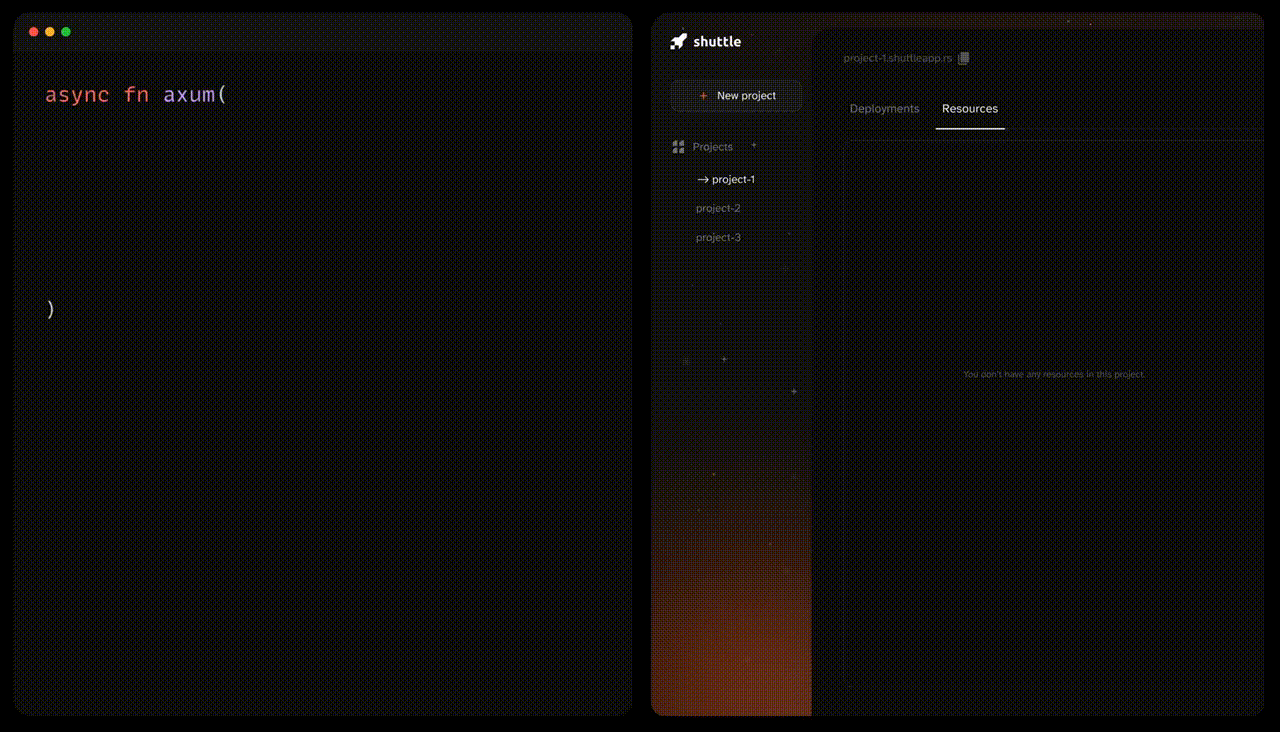Report Bug · Request a Feature · Join Our Discord · Follow us on Twitter
- One-line Resource Provisioning: Get a database, or any other AWS resource by adding a line of code to your main file. To delete one, just remove that line of code. No config/yaml files required.
- Rapid Development: It takes 2 minutes from project initialization to a deployed project. It takes another 2 minutes to provision a resource, and get it deployed to production.
- First-class support for popular Rust frameworks: Axum, Actix Web, Rocket, and more
- Security: Let us worry about the security & permissions while you focus on writing good code.
On Linux and macOS, you can use this install script, which will automatically install the correct target for your OS and distro:
curl -sSfL https://www.shuttle.rs/install | bashOn Windows, you can use this install script to do the same:
iwr "https://www.shuttle.rs/install-win" | iexAfter installing, log in with:
cargo shuttle loginTo initialize your project, simply write:
cargo shuttle init --template axum hello-worldAnd to deploy it, write:
cd hello-world
cargo shuttle project start # Only needed if project has not already been created during init
cargo shuttle deploy --allow-dirtyAnd... that's it!
Service Name: hello-world
Deployment ID: 3d08ac34-ad63-41c1-836b-99afdc90af9f
Status: running
Last Updated: 2022-04-01T08:32:34Z
URI: https://hello-world.shuttleapp.rs
Feel free to build on top of the generated hello-world boilerplate or take a stab at one of our examples.
For the full documentation, visit our docs.
Below is a basic "Hello World" application written in Axum:
use axum::{routing::get, Router};
#[tokio::main]
async fn main() {
let app = Router::new().route("/", get(hello_world));
let listener = tokio::net::TcpListener::bind("127.0.0.1:3000")
.await
.unwrap();
println!("listening on {}", listener.local_addr().unwrap());
axum::serve(listener, app).await.unwrap();
}
async fn hello_world() -> &'static str {
"Hello, world!"
}In order to be able to deploy it with a single command, we update the snippet as follows:
use axum::{routing::get, Router};
async fn hello_world() -> &'static str {
"Hello, world!"
}
#[shuttle_runtime::main]
async fn main() -> shuttle_axum::ShuttleAxum {
let router = Router::new().route("/", get(hello_world));
Ok(router.into())
}Now, with just cargo shuttle deploy, you can see your application live. But let's enhance it further by adding a shared Postgres database:
use axum::{routing::get, Router};
async fn hello_world() -> &'static str {
"Hello, world!"
}
#[shuttle_runtime::main]
async fn main(
#[shuttle_shared_db::Postgres] pool: sqlx::PgPool,
) -> shuttle_axum::ShuttleAxum {
pool.execute(include_str!("../schema.sql"))
.await
.expect("failed to run migrations");
let router = Router::new().route("/", get(hello_world));
Ok(router.into())
}Now, if we run cargo shuttle deploy, we'll have an up and running project with a database inside & ready to use.
| Name | Description |
|---|---|
| shuttle 🚀 (This repo) | The core Shuttle product. Contains all crates that users interact with. |
| shuttle-examples 👨🏫 | Officially maintained examples of projects that can be deployed on Shuttle. Also has a list of community examples. |
| shuttle-docs 📃 | Documentation hosted on docs.shuttle.rs. |
| www 🌍 | Our website shuttle.rs, including the blog and Launchpad newsletter. |
| deploy-action ⚙ | GitHub Action for continuous deployments. |
| awesome-shuttle 🌟 | An awesome list of Shuttle-hosted projects and resources that users can add to. |
| shuttlings ⚔️ | A collection of Rust code challenges. A great way to get started with using Rust and Shuttle. |
Contributing to Shuttle is highly encouraged! Even if you are not planning to submit any code, joining our Discord server and providing feedback helps us a lot!
Check out our contributing docs and find the appropriate repo above to contribute to. For development of this repo, check the development docs.
To offload work from the engineering team on low-priority issues, we will sometimes add a cash bounty to issues. Sign up to the Algora Console to find open issues with bounties.
Check for any outages and incidents on Shuttle Status.
We are currently in Public Beta. Watch "releases" of this repo to get notified of major updates! Also, check out the Beta announcement for features we are looking forward to.
- Alpha: We are testing Shuttle, API and deployments may be unstable
- Public Alpha: Anyone can sign up, but go easy on us, there are a few kinks
- Public Beta: Stable enough for most non-enterprise use-cases
- Public: Production-ready!
Thanks goes to these wonderful people:
Made with contrib.rocks.











